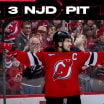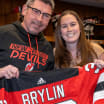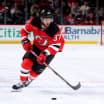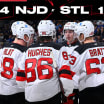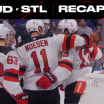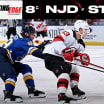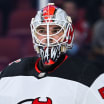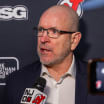Jimmy Devellano was worried.
After being hired away from the dynastic NY Islanders, the Detroit Red Wings general manager had slowly, but relentlessly, crafted a Stanley Cup contender.
Now, in the spring of 1995 the Detroiters were ready for the big prize after a good gallop through the first three playoff rounds.
First, they routed the Dallas Stars, then the San Jose Sharks and, finally, the Chicago Blackhawks. Sure, the Windy City skaters gave Jim's Wings conniptions.
"Three of the games went into overtime," Devellano recalled, "and we won all of them. This was a huge deal for us because it was the first time Detroit had gotten to the Cup Final since 1966."
While likelable Jim worried, the media critics laughed out loud. All of them had gone on record forecasting a landslide Detroit win and had the numbers to back up their predictions.
The Nervous Hours Leading to Game 1 | SUNDAYS WITH STAN
There were nervous hours at Joe Louis Arena leading into Game 1 of the 1995 Stanley Cup Final
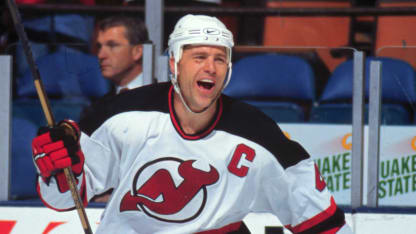
© B Bennett/Getty Images
SUNDAYS WITH STAN
1995 Stanley Cup Final: Devils vs. Red Wings
Previewing the 1995 Final
Before facing the Devils, the Motor City sextet had amassed a 12-2 playoff record. During that aborted, lockout season, the Red Wings finished with 70 points compared with New Jersey's 52.
"With that margin of eighteen points," said Devellano, "everyone expected that we'd win the Stanley Cup."
Before the first face-off drop, a reporter asked the Red Wings boss what he thought of his team's opponents.
"The Devils are very good," Devellano shot back, "and they're hungry. And I know why; Lou Lamoriello put this team together - just like I did here in Detroit. But it was not an easy process."
Lamoriello seconded that motion. Having arrived in New Jersey in time for the 1987-88 season, the proud Rhode Islander surprised those who were unaware of his collegiate successes.
As first the hockey coach and then athletic director at Providence College, Lou appeared to be a university-lifer. That is, until he received a phone call from Devils owner, Dr. John McMullen.
Lamoriello: "I always said that if something interesting came along, I'd consider it, but I wasn't looking for anything. When John told me what he wanted to build and how to do it, I decided to come to New Jersey."
The team that now was challenging Detroit included the result of several deft moves engineered by Lou. They included the following cornerstones of his 1994-95 Cup Finalists.
* BILL GUERIN: The pride of Wilbraham, Massachusetts was plucked fifth overall in the 1989 Entry Draft. He played twice for Uncle Sam in the World Juniors and then quickly played himself on to the Devils. Now in his third year, he scored 20 goals despite the abbreviated schedule.
* SCOTT NIEDERMAYER: Lamoriello traded defenseman Tom Kurvers to Toronto for the Maple Leafs' first pick in 1991. That pick became a future Hall of Famer who played like a third-overall selection should play. He won a Gold Medal with Canada at the World Junior Championship and made his debut in East Rutherford at the end of the following season. "His great offensive ability with an explosive stride and excellent passing are his fortes." So reported a Detroit scouting report.
* MARTIN BRODEUR: This could have been labelled Lamoriello's best move, all-time. Lou made a deal to change his Draft position down and selected Marty in 1990. Within three years, Brodeur won the full-time goaltending job from Chris Terreri and was just reaching his peak during the 1995 playoffs. Taught by his goalie-dad, Denis, who won Bronze on the 1956 Canadian Olympic Team, Marty now was being guided by former NHL puck-stopper Jacques Caron, New Jersey's goalie coach.
* CLAUDE LEMIEUX: Hockey historian Andrew Podnieks wrote a book called "Players - The Ultimate A to Z Guide." Podnieks' scouting report on Claude began as follows: "Lemieux became one of the most important playoff performers of the modern era and also one of the most vilified characters." During the three series leading up to this 1995 Final, the French-Canadian ace already had demonstrated - especially his biggie third period winning goal in the third round against Philadelphia - that his nickname also could be Mister Clutch.
* STEPHANE RICHER: Lou obtained the slick shooter from the Montreal Canadiens in 1991. Under coach Jacques Lemaire, the Ripon, Quebec native reached his peak as an NHL forward. Like teammate Lemieux, Richer excelled in the first three rounds of the 1995 crusade and would prove a threat every time he took the ice. NHL goalies especially feared both his wrist and slapshots.
* SCOTT STEVENS: Devils veteran beat reporter Rich Chere was among many who commended Lamoriello for landing Stevens. In Chere's history of the Devils, Rich described the manner in which the move was pulled off by Lou. (Remember, Stevens previously had starred for the St. Louis Blues.) "Lou and his staff convinced an NHL arbitrator to award Stevens as 'compensation' after Brendan Shanahan signed with St .Louis," Chere explained. Stevens became New Jersey's captain and - after his retirement - was a no-brainer for the Hall of Fame.
* RANDY MCKAY: This one was a vastly underrated Lou move. His Devils enforcer, Troy Crowder, won a fight with Detroit's tough Bob Probert and became the hot topic guy of the month. When the Wings signed Crowder, Lou got McKay as compensation. McKay became a vital cog on the "Crash Line" with Bobby Holik and Mike Peluso while Crowder proved a disaster in Detroit. With New Jersey, McKay developed into a gritty right winger who could score and play disciplined hockey. Randy was at the top of his game during the 1995 sprint for Stanley.
BOBBY HOLIK: Another masterful Lou move sent goalie Sean Burke and defenseman Eric Weinrich to Hartford for this hard-hitting winger. Historian Podnieks critiqued Holik as follows: "He had phenomenal quickness and used his body to purpose. He could score as well as anyone and he could check the best players in the league on the ice. In the playoffs he could shut down the best the other team had to offer."
JACQUES LEMAIRE: He was hired in 1993 and by 1995 had developed the Devils into a genuine contender for the big prize. Despite Lemaire's oft-criticized defensive plans, New Jersey entered the Final round as one of the NHL's best offensive teams.
Other key pieces included Neal Broten, Shawn Chambers and New Jersey product Jim Dowd, just to name a few.
As fans streamed into Joe Louis Arena anticipating a Red Wings victory, the press box began filling as well. One bloc of writers discussed the subject of leadership and, without question, Steve Yzerman's name emerged as the unequivocal Detroit inspiration.
But did the Devils have anyone who could match Stevie Y?
So far, it came down to captain Stevens. One club executive put it this way: "Brodeur will go down as the last line of defense but Stevens provides the leadership. He was the last piece we needed to challenge for The Cup."
Rich Chere: "Scott's presence in the dressing room and on the team bus and charter flights did as much to bring professionalism to the organization as Lou's strict rules and watchful eye. Teammates were afraid to upset the captain, whom they called 'Dad.'"
Others called him the greatest body checker in NHL history. It was a label that would prove well deserved in the series ahead.
"When Lemaire arrived in 1993," Chere added, "Stevens was an offensive factor as well as a defensive force. Scott was asked to change his game for the benefit of the team, and he did. In doing so, he changed the course of Devils history."
Now it was time for the opening face-off and Jim Devellano still was fretting. "I knew we had Steve Yzerman, Sergei Federov and Scotty Bowman behind the bench as well as home-ice advantage.
"I knew we had more experience and more balance than the Devils. But I had had enough experience working with the Blues and then the Islanders to know that an upset could happen any time in the playoffs."
And so it did. Plus, I was there to witness the stunning events that followed.

